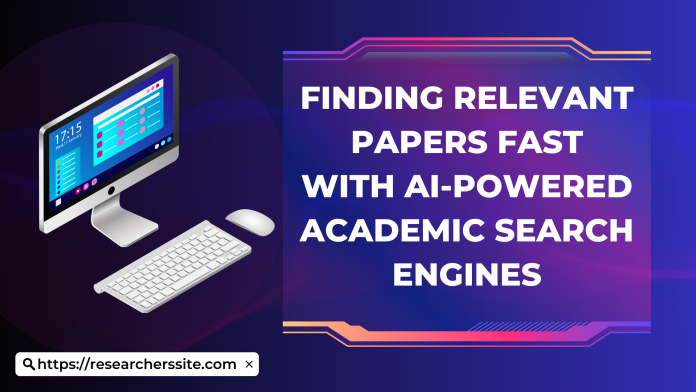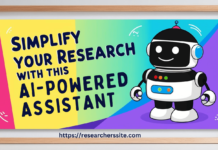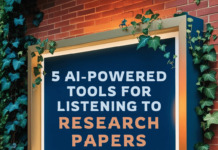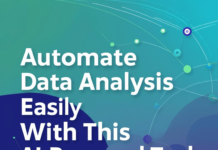In this blog post, I will discuss how AI-powered academic search engines can help you find relevant papers fast. Academic research can be a daunting task, especially when you are trying to find relevant papers to support your work. Traditional academic search engines can be slow and inefficient, and they often return irrelevant results.
In a previous post, I have shared a comprehensive post on Useful Academic Search Engine for Research where I have discussed traditional academic search engine.
You have to sift through hundreds or thousands of academic papers (using keywords, filters, and citations) to find the most relevant scholarly article. And even then, you might miss some relevant papers that could make a difference in your research.
But what if there was a better way to find the right papers for your research in minutes? What if you could use the power of artificial intelligence (AI) to help you discover and explore the most relevant papers for your research topic?
That’s where AI-powered academic search engines come in.
In this blog post, we will take a look at some of the benefits of using AI-powered academic search engines, and I will recommend a few of the best options available.
Benefits of AI-Powered Academic Search Engines
There are several benefits to using AI-based academic search engines:
# Search across millions of academic papers from different domains and disciplines
#Find relevant papers without perfect keyword match
#Discover related works based on citations, references, or semantic similarity
#Analyze research trends and impact
#Get personalized recommendations and alerts based on your interests and preferences
#Summarize key takeaways from the academic papers specific to your question
#Extract key information from the research papers such as authors, affiliations, abstracts, figures, tables, etc.
Best AI-Powered Academic Search Engines for Finding Relevant Papers
There are several AI-powered academic search engines available, but some of the best include:
#1 Semantic Scholar
A free, AI-powered research tool for scientific literature that lets you search millions of scholarly articles for academic content relevant to your research topic.
It also offers an augmented reader that can provide more context and insights from the papers.
#2 Elicit
An AI research assistant that uses language models to help you automate research workflows, such as literature review, summarization, and text classification.
Elicit can find relevant papers without perfect keyword match, summarize takeaways from the paper specific to your question, and extract key information from the papers.
It is an application that helps you in finding the most relevant information from academic journal articles by utilizing Large Language Models (LLM, specifically GPT-3).
In my prior blog post, I gave a comprehensive description of Elicit.
#3 Scinapse
An AI-powered research intelligence engine that helps you access over 200 million academic papers from various sources, such as PubMed, IEEE, Springer, and Elsevier.
Scinapse can help you find relevant papers, filter them by various criteria, and provide smart suggestions based on your queries.
#4 Iris.ai
Iris.ai is an intelligent research assistant that employs Artificial Intelligence (AI) and machine learning techniques to assist researchers in exploring and validating scientific papers.
Its AI algorithms analyze research articles and identify key concepts, methodologies, and connections between papers. Through an interactive interface, researchers can input their research questions or provide a summary of their study.
And Iris.ai uses its AI capabilities to suggest relevant papers. This AI-powered approach helps researchers quickly navigate through the vast sea of scientific literature and identify the most suitable papers for their research projects.
#5 Dimensions
Comprehensive Research Intelligence Dimensions is an AI-driven research platform that integrates scholarly literature, citations, grants, clinical trials, and patents data into a unified database.
With its advanced AI algorithms, Dimensions offers a comprehensive research intelligence solution. Researchers can easily search for relevant papers, identify influential works through citation analysis, and gain insights into funding opportunities and collaborations.
The AI-powered features of Dimensions enable researchers to make informed decisions and save time in their quest for the right papers.
#6 Concensus
If you are looking for evidence-based answers from scientific research, you might want to try Consensus, a new AI-powered search engine that can help you find and access relevant papers in seconds.
Consensus uses AI to analyze peer-reviewed, published sources and extract key findings that answer your research question. You can also explore related works, get personalized recommendations, and share your results with others.
Consensus is a free and ad-free tool that aims to democratize expert knowledge and make research easier and faster.
Here are some of the benefits of using Consensus:
- It can understand natural language queries, so you can search for what you want without having to know the exact keywords.
- It can provide more relevant results than traditional search engines.
- It can help you find papers that are new or that have been recently updated.
- It can help you find papers that are related to your research, even if they are not published in the same journal or conference.
If you’re looking for a way to speed up your academic research, then Consensus is a great option.
AI-powered academic search engines are a great way to speed up your academic research. By using one of these engines, you can find the right papers for your research in minutes.
AI-powered academic search engines have emerged as indispensable tools for researchers in their quest to find relevant papers efficiently.














